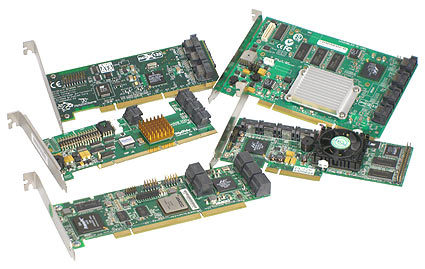SATA Spells Trouble for SCSI RAID: Five Controllers Put to the Test
SATA II Hits The RAID Stage
These days it is getting harder for administrators to make the right choices. Only a couple of years ago, you could either eke out the budget for a sophisticated SCSI RAID solution, or put together something rather simple using ATA products. However, the first ATA solutions were hopelessly inferior when compared to any SCSI products. The SATA revolution has changed this dramatically, and today the latest SATA II armada of powerful and cost effective solutions is about to sound the death knell for the vast majority of classic SCSI domains.
We received five RAID controller cards - one a x8 PCIe unit, while the others running on PCI-X - all designed for 'Serial ATA II operation'. The problem with this is understanding exactly what it means. Anything that exceeds the common SATA 1.0a standard (150 MB/s per port) is that it either isn't part of an adopted standard (SATA II does not equal SATA 2.0) or it leaves room to add features as an option (SATA 2.5). So if you insist on having certain SATA 2.5 features, such as 300 MB/s bandwidth, Native Command Queuing (NCQ), staggered drive spin-up, port hot-plugging, external SATA (eSATA) connectivity, activity LEDs, logging or port multiplying, you still have to check these one by one - SATA II will not guarantee you get them. For more information on SATA 2.5 features, please visit the SATA-IO website .
The good news is that most of the interesting features have been implemented into the products we received for review. AMCC/3Ware, Areca, Broadcom/Raidcore, HighPoint and LSI logic do support high bandwidth devices and NCQ. We compared the five controllers based on their bus interfaces, card form factors, number of ports supported, internal architectures, the type of software they include, driver support, and their particular features.
The controllers from Broadcom/Raidcore and HighPoint are software based, while the three hardware accelerated RAID units from AMCC/3Ware, Areca and LSI Logic offer more efficient CPU offload. We found that no card comes off as a clear winner, because there are too many factors to consider. However, the performance race is dominated by AMCC/3Ware and Areca, while Broadcom/Raidcore and AMCC did the best job in adding features.
Let's take a look at the contenders.
Get Tom's Hardware's best news and in-depth reviews, straight to your inbox.

Patrick Schmid was the editor-in-chief for Tom's Hardware from 2005 to 2006. He wrote numerous articles on a wide range of hardware topics, including storage, CPUs, and system builds.
